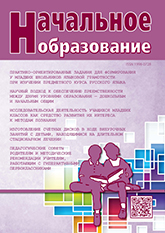Irkutsk, Irkutsk region, Russian Federation
The authors of the article substantiate the relevance of expanding the term “educational independence” to the concept of “educational independence”, which is proposed for use in primary school didactics. Educational independence, in contrast to educational independence, is not limited to educational situations, but also manifests itself in arbitrary cognitive activity, which meets modern requirements for learning outcomes, regardless of its period. However, when characterizing educational independence, it is necessary to take into account the individual capabilities of children of primary school age. As an effective means of developing educational independence, the article considers the construction of an individual educational route for a younger student, analyzes the process of its development using the Moodle distance learning system, which includes four stages: diagnostic, design, technological and evaluation. The sequence of joint actions of a teacher and a student to draw up a map of his individual educational route within the framework of a separate academic subject is given.
the concepts of “educational independence” and “educational independence”; development of the educational independence of a younger student; designing an individual educational route; student-centered learning; distance learning system Moodle
1. Abramov S.M. Vospitanie obrazovatel'noj samostojatel'nosti studentov gumanitarnyh vuzov v processe distancionnogo obuchenija. Kand. Diss [Education of educational independence of students of humanitarian universities in the process of distance learning. Cand. Diss]. Ekaterinburg, 2003. 22 p. EDN: https://elibrary.ru/ZMRUCD
2. Bystrova T.V. Osobennosti samostojatel'nosti mladshego shkol'nika [Features of the independence of a younger student]. Formirovanie mladshego shkol'nika kak sub#ekta uchebnoj dejatel'nosti: mezhvuzovskij sbornik nauchnyh trudov LGPI im. A.I. Gercena [Formation of a younger student as a subject of educational activity: an interuniversity collection of scientific papers of the Leningrad State Pedagogical Institute named after A.I. Herzen]. St. Petersburg: LGPI Publ., 2000, pp. 52-64.
3. Ermakova O.N. Vospitanie obrazovatel'noj samostojatel'nosti budushhego uchitelja sredstvami predmetno-didakticheskogo kompleksa pedagogicheskih discipline. Kand. Diss [Education of the future teacher's educational independence by means of a subject-didactic complex of pedagogical disciplines. Cand. Diss]. Magnitogorsk, 2007. 24 p. EDN: https://elibrary.ru/NJBCFJ
4. Kalinina N.V., Prohorova S.Ju. Uchebnaja samostojatel'nost' mladshego shkol'nika: diagnostika i razvitie uchebnoj samostojatel'nosti mladshego shkol'nika [Educational independence of a younger student: diagnosis and development of educational independence of a younger student]. Moscow: ARKTI Publ., 2008. 77 p.
5. Rydze O.A. Uchebnaja samostojatel'nost' mladshego shkol'nika: puti razvitija [Educational independence of primary schoolchildren: ways of development]. Nachal'naja shkola [Primary school]. 2017, I. 9, pp. 45-51. EDN: https://elibrary.ru/YOQMDQ
6. Cukerman G.A., Venger A.L. Razvitie uchebnoj samostojatel'nosti mladshego shkol'nika [Development of educational independence of a younger student]. Moscow: Avtorskij klub Publ., 2015. 432 p.






